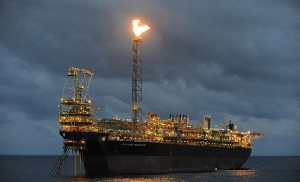File photo [FPSO Nkrumah vessel] The Ghana National Petroleum Corporation (GNPC) says it will pursue diversified revenue generation sources following a 15 percent reduction in oil production from the country’s oil fields in the wake of the coronavirus outbreak.
General Manager, Commercial at GNPC, Joseph Dadzie said the outbreak of the pandemic has led to a 30 percent shortfall in the corporation’s revenue compelling it to revise its expenditure downwards by 34 percent.
In order for GNPC to stay capitalised, he said the corporation will pursue diversified revenue generation sources, saying “diversification is necessary for long-term survival of the corporation.”
“If your only source of income is from the selling of oil and in this COVID-19 times where the price of oil has plunged into an all-time low, then you will be faced with revenue challenges.
The corporation is focused on strengthening its accelerated growth strategy by consolidating its operatorship drive for effective financial sustainability and independence to take a commanding lead in the upstream petroleum sector in Ghana,” Mr. Dadzie added.
Speaking at the Natural Resource Governance Institute (NRGI) National Dialogue on GNPC’s Sustainability, Mr. Dadzie said the GNPC also wants to limit its reliance on expatriates and invest in adequate human, technical and commercial resources.
The move, he said, is to ensure that the sector, which is capital intensive, can also create jobs for Ghanaians.
The 2020 mid-year budget revealed a total of US$80.41million of the total petroleum receipts for the first half of 2020 was transferred to GNPC.
The upstream petroleum sector, which accounts for about 7 percent of the government’s total revenue, is seeing challenging times not just due to lower oil prices, but also because of reduced production levels by Tullow Oil, operator of Jubilee, Ghana’s first oil field.
The lower anticipated revenue for 2020 has also led to reductions in budget expenditures and transfers to the Ghana Stabilisation and Heritage funds.
Government’s 2020 budget was based on an oil-price assumption of US$62.6 per barrel, and total petroleum revenue was projected at US$1.6 billion. However, crude oil prices dropped sharply to record lows following the outbreak of the coronavirus disease and a price war between leading producers Russia and Saudi Arabia.
